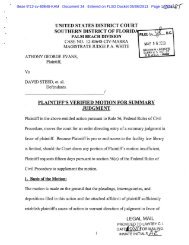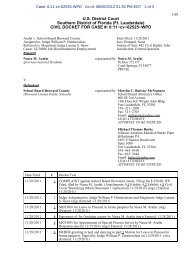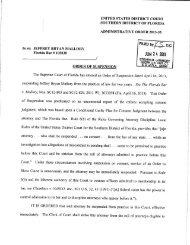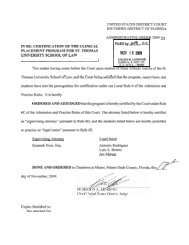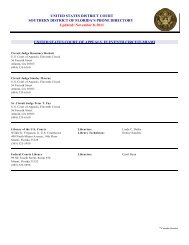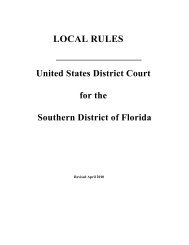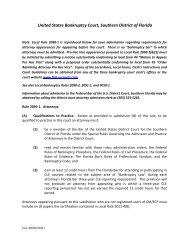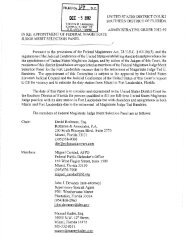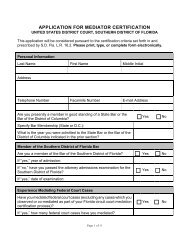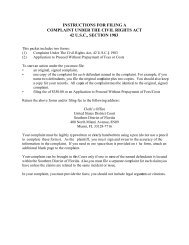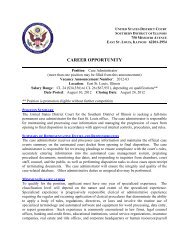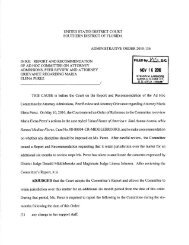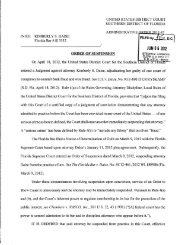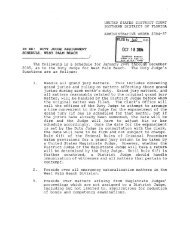JAN j 6 2010 - United States District Court
JAN j 6 2010 - United States District Court
JAN j 6 2010 - United States District Court
You also want an ePaper? Increase the reach of your titles
YUMPU automatically turns print PDFs into web optimized ePapers that Google loves.
have, or claims to have, a possessory interest in the property.<br />
The party seeking entry of default judgment under Local Rule C(8)3(h) may be<br />
excused for failing to give notice to such "other person" upon a satisfactory<br />
showing that diligent effort was made to give notice without success,- and<br />
f(3) Publication as required by Supplemental Rule C(4) and Local Admiralty<br />
Rule C(4)3(d).<br />
Upon review of the motion, memorandum, and other proof, the Clerk of the <strong>Court</strong><br />
may, where appropriate, enter default in accordance with Federal Rule of Civil<br />
Procedure 55. Thereafter, the Clerk of the <strong>Court</strong> shall serve notice of the<br />
entry of default upon all parties represented in the action.<br />
494-(i) Procedural Requirements for the Entry of Default Judgment. Not later<br />
than thirty (30) days following notice of the entry of default, the moving<br />
party shall file a motion, and supporting legal documents, for the entry of<br />
default judgment pursuant to Federal Rule of Civil Procedure 55(b). The moving<br />
party may also file as exhibits for the motion such other documentation as may<br />
be required to support the entry of default judgment. Thereafter the <strong>Court</strong><br />
will consider the motion as indicated below:<br />
f(1) When No Person Has Filed a Claim or Answer. Unless otherwise ordered by<br />
the <strong>Court</strong>, the motion for default judgment will be considered by the <strong>Court</strong><br />
without oral argument.<br />
-ftef (2) When Any Person Has Filed an Appearance, But Does Not Join in the Motion<br />
for Entry of Default Judgment. If any person has filed an appearance in<br />
accordance with Local Admiralty Rule C(6) 3 (f) , but does not join in the motion<br />
for entry of default judgment, the party seeking the entry of default judgment<br />
shall serve notice of the motion upon the party not joining in the motion, and<br />
thereafter the opposing party shall have five seven (7) days from receipt of<br />
the notice to file written opposition with the <strong>Court</strong>.<br />
If the <strong>Court</strong> grants the motion and enters the default judgment, such judgment<br />
shall establish a right on the part of the party or parties in whose favor it<br />
is entered. The judgment shall be considered prior to any claims of the owner<br />
of the defendant property against which it is entered, and to the remnants and<br />
surpluses thereof; providing, however, that such a judgment shall not<br />
establish any entitlement to the defendant property having priority over<br />
non-possessory lien claimants. Obtaining a judgment by default shall not<br />
preclude the party in whose favor it is entered from contending and proving<br />
that all, or any portion, of the claim or claims encompassed within the<br />
judgment are prior to any such non-possessory lien claims.<br />
Effective Dec. 1, 1994. Amended effective April 15, 1998; April 15, 2000;<br />
April 15, 2001; April 15, 2007.<br />
Advisory Notes<br />
(1993) C(2). Well reasoned authority has upheld Supplemental Rule C,<br />
specifically holding that a pre-seizure judicial hearing is not required where<br />
a vessel, freight, or intangible property is proceeded against to enforce a<br />
maritime lien. Amstar Corporation v. S S Alexandros T, 664 F.2d 904 (4th<br />
116



